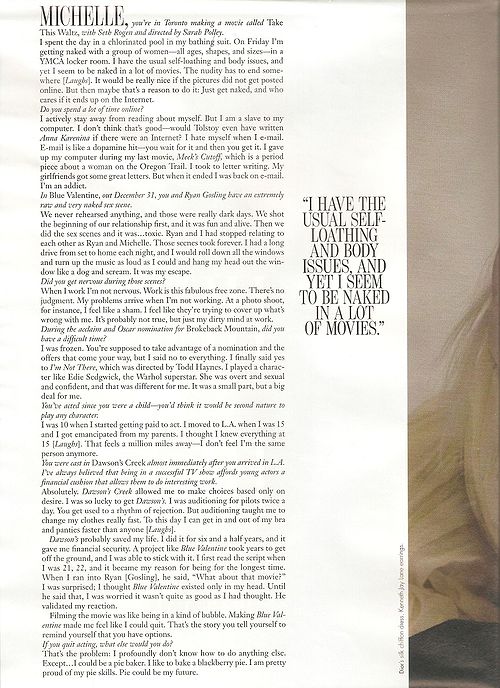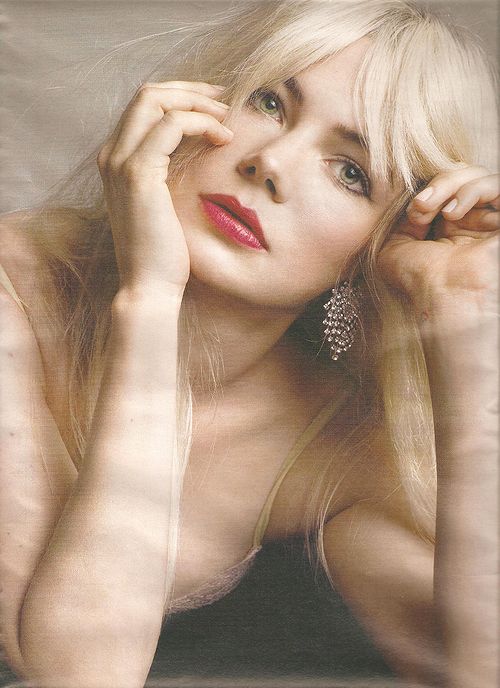Heart to Heart - W Magazine - 2010 (October)
This article is from W Magazine, dated October 2010, featuring Ryan Gosling.
The high-res magazine scans are from Gosling Fan.
Cover headline: Boy Meets Girl - Ryan Gosling & Michelle Williams
Heart to Heart
Michelle Williams & Ryan Gosling talk about messy sex, bad body art, and the long road to their new film, Blue Valentine.
By Lynn Hirschberg
Michelle, you're in Toronto making a movie called Take This Waltz, with Seth Rogen and directed by Sara Polley.
I spent the day in a chlorinated pool in my bathing suit. On Friday I'm getting naked with a group of women - all ages, shapes, and sizes - in a YMCA locker room. I have the usual self-loathing and body issues, and yet I seem to be naked in a lot of movies. The nudity has to end somewhere [Laughs]. It would be really nice if the pictures did not get posted online. But then maybe that's a reason to do it: Just get naked, and who cares if it ends up on the Internet.
Do you spend a lot of time online?
I actively stay away from reading about myself. But I am a slave to my computer. I don't think that's good - would Tolstoy even have written Anna Karenina if there were an Internet? I hate myself when I e-mail. E-mail is like a dopamine hit - you wait for it and then you get it. I gave up my computer during my last movie, Meek's Cutoff, which is a period piece about a woman on the Oregon Trail. I took to letter writing. My girlfriends got some great letters. But when it ended I was back on e-mail. I'm an addict.
In Blue Valentine, out December 31, you and Ryan Gosling have an extremely raw and very naked sex scene.
We never rehearsed anything, and those were really dark days. We shot the beginning of our relationship first, and it was fun and alive. Then we did the sex scenes and it was... toxic. Ryan and I had stopped relating to each other as Ryan and Michelle. Those scenes took forever. I had a long drive from set to home each night, and I would roll down all the windows and turn up the music as loud as I could and hang my head out the window like a dog and scream. It was my escape.
Did you get nervous during those scenes?
When I work I'm not nervous. Work is the fabulous free zone. There's no judgment. My problems arrive when I'm not working. At a photo shoot, for instance, I feel like a sham. I feel like they're trying to cover up what's wrong with me. It's probably not true, but just my dirty mind at work.
During the acclaim and Oscar nomination for Brokeback Mountain, did you have a difficult time?
I was frozen. You're supposed to take advantage of a nomination and the offers that come your way, but I said no to everything. I finally said yes to I'm Not There, which was directed by Todd Haynes. I played a character like Edie Sedgwick, the Warhol superstar. She was overt and sexual and confident, and that was different for me. It was a small part, but a big deal for me.
You've acted since you were a child - you'd think it would be second nature to play any character.
I was 10 when I started getting paid to act. I moved to L.A. when I was 15 and I got emancipated from my parents. I thought I knew everything at 15 [Laughs]. That feels like a million miles away - I don't feel I'm the same person anymore.
You were cast in Dawson's Creek almost immediately after you arrived in L.A. I've always believed that being in a successful TV show affords young actors a financial cushion that allows them to do interesting work.
Absolutely. Dawson's Creek allowed me to make choices based only on desire. I was so lucky to get Dawson's. I was auditioning for pilots twice a day. You get used to a rhythm of rejection. But auditioning taught me to change my clothes really fast. To this day I can get in and out of my bra and panties faster than anyone [Laughs].
Dawson's probably saved my life. I did it for six and a half years, and it gave me financial security. A project like Blue Valentine took years to get off the ground, and I was able to stick with it. I first read the script when I was 21, 22, and it became my reason for being for the longest time. When I ran into Ryan [Gosling], he said, "What about that movie?" I was surprised; I thought Blue Valentine existed only in my head. Until he said that, I was worried it wasn't quite as good as I had thought. He validated my reaction.
Filming the movie was like being in a kind of bubble. Making Blue Valentine made me feel like I could quit. That's the story you tell yourself to remind yourself that you have options.
If you quit acting, what else would you do?
That's the problem: I profoundly don't know how to do anything else. Except... I could be a pie baker. I like to bake a blackberry pie. I am pretty proud of my pie skills. Pie could be my future.
~*~
Ryan, you're from Canada, but you seem distinctly American. You don't have a Canadian accent.
As a kid I decided that a Canadian accent doesn't sound tough. I thought guys should sound like Marlon Brando. So now I have a phony accent that I can't shake, so it's not phony anymore. I'm going for the Madonna thing, the Lady Gaga thing - a phony accent that becomes your trademark.
And you have interesting tattoos - they look like you got them in prison.
I like when they look bad, but no one will do bad tattoos. So I did one myself. That's why it's bad. I'm waiting to get old - I think old guys with tattoos look good.
You can't be buried in a Jewish cemetery, but then you're not Jewish.
I'm honorary. I did a film called The Believer, where I played a Jew who is a neo-Nazi skinhead. That part gift wrapped me my career. I got that movie when I had done Young Hercules and The Mickey Mouse Club. Nobody wanted to see me. Months earlier I was in New Zealand with a fake tan and leather pants, fighting imaginary sphinxes. After The Believer I was at Sundance, and people were talking to me about my craft.
Did you like being a Mouseketeer?
I wasn't happy on the show, but I was happy to not be going to school, to be working. More than the show, Disney World made a big impression on me. I still go to Disneyland as much as I can. The Haunted Mansion is my favorite ride. I first rode it when I was 12 or 13, and when I came around the corner and all those ghosts were dancing, it made death look like it would be fun. The Mouseketeers didn't end up using me very much, which felt awful, but the park had a big impact on me. Disney had this dream, and you could experience it. I loved the attention to detail. There's a lesson in that.
Your latest movie, Blue Valentine, is an intense depiction of a romance. The movie is extraordinarily intimate - it almost feels like a documentary. Was it difficult to make?
I took forever; for four years Blue Valentine would be ready to go, and then the film would fall apart due to financing or timing. It was always me and Michelle [Williams] - I think Michelle was involved for five or six years. Finally, the planets aligned and we shot it last summer in Pennsylvania. The director, Derek Cianfrance, had us living as these characters. If, for instance, today was a fighting day, we would just pick fights with each other all day. Once, I fell asleep in the middle of a take, and we filmed through it. After I woke up, Michelle said, "We did the scene, and we filmed you sleeping on the couch."
How about the sex scene? The couple is fighting, and it's the angriest, most realistic sex scene I've seen in a film in years.
You mean the trying-not-to-have-sex sex scene? It was hard... a lot of times actors can trick people into thinking something is happening when it's not happening, and we had to call ourselves out on anything that didn't feel honest. Actors become very professional and proficient about watching out for each other's light and not stepping on each other's lines. All of these things are artificial, and you have to strip that away if you're going to achieve a sense of intimacy. In real life sex is messy, and we wanted to achieve a sense of intimacy. In real like sex is messy, and we wanted to get at that wonderful messiness.
Did you watch a lot of John Cassavetes to get in the mood?
Not really. But I love Peter Falk. I wish I could be Peter Falk. When I made The Notebook, the director, Nick Cassavetes, who is John's son, used to show me his father's movies. He told me so many stories: John would have an idea for a movie, and he'd wake Nick up in the middle of the night and pitch the story to him. Nick would start to fall asleep, and his dad would rearrange the plot to keep him interested. Actually, the story never mattered. John was mostly interested in the characters. If the character is true, the movie will fall into place. Or at least that's what you hope.
Is that why you watch a lot of reality TV? Are you looking for the truth on, say, Cake Wars?
In a way. You do see human nature on those shows. But unfortunately fondant has changed the entire nature of cake decorating. It used to be more creative - fondant has changed everything.






